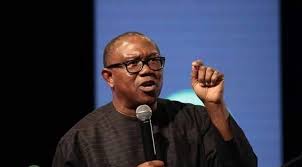The Presidential Candidate of the Labour Party in the 2023 general elections, Mr. Peter Obi has advised the government to focus more on maintaining existing infrastructure, rather than embarking on the construction of new ones.
Obi who was speaking at the inaugural Leadership Lecture on “The Politics of Energy and the Way Forward” to mark the 64th birthday of Chief Dele Momodu, on Thursday in Lagos, emphasized that the country must prioritize fixing existing infrastructure before embarking on new projects.
Notable leaders present at the event included the chairman of the occasion, former President of Ghana John Mahama, with the keynote speaker being Prof. Bart Nnaji, the former Minister of Power. Other distinguished attendees included former Governor of Cross River State, Donald Duke, Governor Ademola Adeleke of Osun State, and the Presidential Candidate for the NNPP, Rabiu Kwankwaso, among others.
Obi thanked the celebrant for enhancing the auditorium at the Nigerian Institute of International Affairs in Victoria Island, Lagos, and reiterated that energy is the fundamental driver of economic growth, development, and sustainability.
Reacting to the remark by the former President of Ghana John Mahama that 88.54 percent of Ghanaians have access to electricity, Mr. Peter Obi compared this figure to Nigeria’s 11.27 percent (as of Q1, 2023). The Ghanaian government has set an ambitious target of achieving universal access to electricity by the end of 2024, consistent with the United Nations’ Sustainable Development Goal 7 (SDG7), which aims to ensure access to affordable, reliable, and modern energy for all by 2030. In contrast, Nigeria faces significant challenges in providing electricity access to its population, with over 80 percent of Nigerians still lacking access to grid electricity. Despite having a total installed generation capacity of 13,000 megawatts, Nigeria’s transmission and distribution infrastructure struggles to deliver a meager 3,500 to 4,500 megawatts to homes and businesses. Ghana’s electricity grid has experienced remarkable stability over the years, thanks to the government’s and stakeholders’ constant efforts to enhance the nation’s electricity industry. This stability has improved the welfare of Ghanaians and facilitated business operations. In contrast, Nigeria’s power grid faces frequent collapses, with the most recent incidents occurring in September 2023. The country’s grid instability is attributed to various factors, including a fire at the Kainji/Jebba 330kV line 2, which resulted in the loss of two transmission transformers and a nationwide outage. Mr. Obi stressed the need for visionary leadership in Nigeria, especially regarding energy, which is the backbone of the modern global economy. He emphasized that the availability, accessibility, and affordability of energy resources profoundly impact economic activity, growth, and development. The transition to sustainable energy sources is crucial for a resilient and prosperous future.


